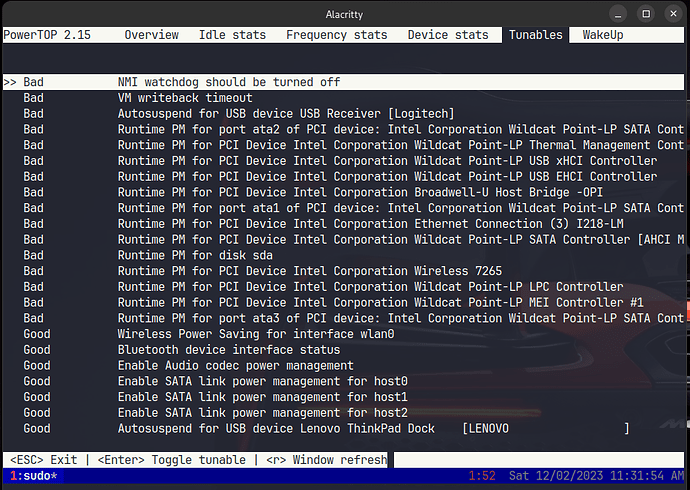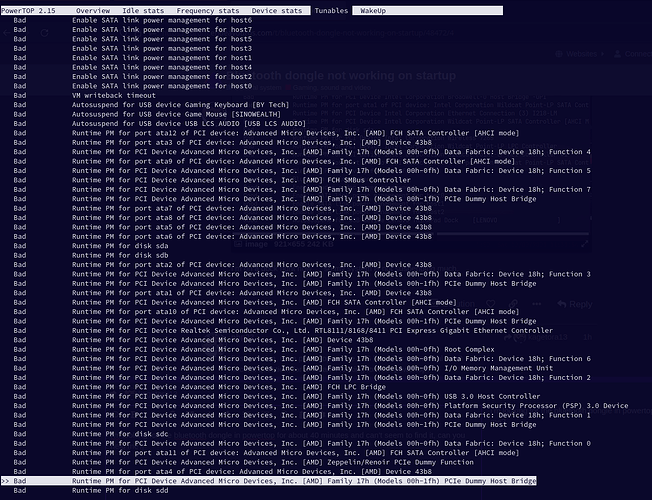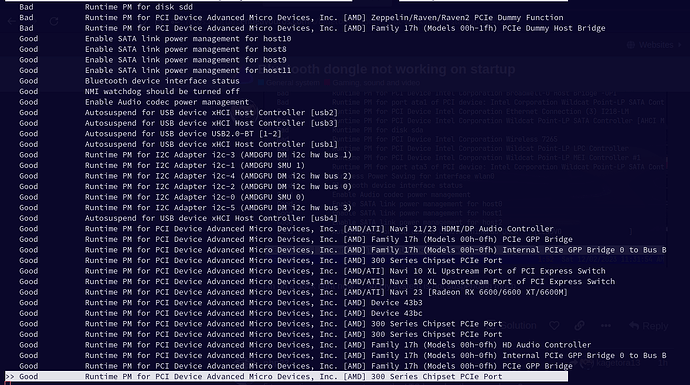- i didn’t make any changes regarding bluetooth in my bios.
Summary
lsusb
Bus 001 Device 001: ID 1d6b:0002 Linux Foundation 2.0 root hub
Bus 001 Device 003: ID 0a12:0001 Cambridge Silicon Radio, Ltd Bluetooth Dongle (HCI mode)
Bus 002 Device 001: ID 1d6b:0003 Linux Foundation 3.0 root hub
Bus 003 Device 001: ID 1d6b:0002 Linux Foundation 2.0 root hub
Bus 003 Device 002: ID 258a:1007 SINOWEALTH Game Mouse
Bus 003 Device 003: ID 0a67:8c01 Medeli Electronics Co., Ltd USB LCS AUDIO
Bus 003 Device 004: ID 258a:0049 BY Tech Gaming Keyboard
Bus 004 Device 001: ID 1d6b:0003 Linux Foundation 3.0 root hub
- Yes.
Summary
[General]
# Default adapter name
# Defaults to 'BlueZ X.YZ'
#Name = BlueZ
# Default device class. Only the major and minor device class bits are
# considered. Defaults to '0x000000'.
#Class = 0x000100
# How long to stay in discoverable mode before going back to non-discoverable
# The value is in seconds. Default is 180, i.e. 3 minutes.
# 0 = disable timer, i.e. stay discoverable forever
#DiscoverableTimeout = 0
# Always allow pairing even if there are no agent registered
# Possible values: true, false
# Default: false
#AlwaysPairable = false
# How long to stay in pairable mode before going back to non-discoverable
# The value is in seconds. Default is 0.
# 0 = disable timer, i.e. stay pairable forever
#PairableTimeout = 0
# Use vendor id source (assigner), vendor, product and version information for
# DID profile support. The values are separated by ":" and assigner, VID, PID
# and version.
# Possible vendor id source values: bluetooth, usb (default) or false (disabled)
#DeviceID = bluetooth:1234:5678:abcd
# Do reverse service discovery for previously unknown devices that connect to
# us. For BR/EDR this option is really only needed for qualification since the
# BITE tester doesn't like us doing reverse SDP for some test cases, for LE
# this disables the GATT client functionally so it can be used in system which
# can only operate as peripheral.
# Defaults to 'true'.
#ReverseServiceDiscovery = true
# Enable name resolving after inquiry. Set it to 'false' if you don't need
# remote devices name and want shorter discovery cycle. Defaults to 'true'.
#NameResolving = true
# Enable runtime persistency of debug link keys. Default is false which
# makes debug link keys valid only for the duration of the connection
# that they were created for.
#DebugKeys = false
# Restricts all controllers to the specified transport. Default value
# is "dual", i.e. both BR/EDR and LE enabled (when supported by the HW).
# Possible values: "dual", "bredr", "le"
#ControllerMode = dual
# Maximum number of controllers allowed to be exposed to the system.
# Default=0 (unlimited)
#MaxControllers=0
# Enables Multi Profile Specification support. This allows to specify if
# system supports only Multiple Profiles Single Device (MPSD) configuration
# or both Multiple Profiles Single Device (MPSD) and Multiple Profiles Multiple
# Devices (MPMD) configurations.
# Possible values: "off", "single", "multiple"
#MultiProfile = off
# Permanently enables the Fast Connectable setting for adapters that
# support it. When enabled other devices can connect faster to us,
# however the tradeoff is increased power consumptions. This feature
# will fully work only on kernel version 4.1 and newer. Defaults to
# 'false'.
#FastConnectable = false
# Default privacy setting.
# Enables use of private address.
# Possible values for LE mode: "off", "network/on", "device"
# Possible values for Dual mode: "off", "network/on", "device",
# "limited-network", "limited-device"
#
# - off: Local privacy disabled.
#
# - network/on: A device will only accept advertising packets from peer
# devices that contain private addresses. It may not be compatible with some
# legacy devices since it requires the use of RPA(s) all the time.
#
# - device: A device in device privacy mode is only concerned about the
# privacy of the device and will accept advertising packets from peer devices
# that contain their Identity Address as well as ones that contain a private
# address, even if the peer device has distributed its IRK in the past.
# - limited-network: Apply Limited Discoverable Mode to advertising, which
# follows the same policy as to BR/EDR that publishes the identity address when
# discoverable, and Network Privacy Mode for scanning.
#
# - limited-device: Apply Limited Discoverable Mode to advertising, which
# follows the same policy as to BR/EDR that publishes the identity address when
# discoverable, and Device Privacy Mode for scanning.
#
# Defaults to "off"
#Privacy = off
# Specify the policy to the JUST-WORKS repairing initiated by peer
# Possible values: "never", "confirm", "always"
# Defaults to "never"
#JustWorksRepairing = never
# How long to keep temporary devices around
# The value is in seconds. Default is 30.
# 0 = disable timer, i.e. never keep temporary devices
#TemporaryTimeout = 30
# Enables the device to issue an SDP request to update known services when
# profile is connected. Defaults to true.
#RefreshDiscovery = true
# Default Secure Connections setting.
# Enables the Secure Connections setting for adapters that support it. It
# provides better crypto algorithms for BT links and also enables CTKD (cross
# transport key derivation) during pairing on any link.
# Possible values: "off", "on", "only"
# - "off": Secure Connections are disabled
# - "on": Secure Connections are enabled when peer device supports them
# - "only": we allow only Secure Connections
# Defaults to "on"
#SecureConnections = on
# Enables D-Bus experimental interfaces
# Possible values: true or false
#Experimental = false
# Enables kernel experimental features, alternatively a list of UUIDs
# can be given.
# Possible values: true,false,<UUID List>
# Possible UUIDS:
# d4992530-b9ec-469f-ab01-6c481c47da1c (BlueZ Experimental Debug)
# 671b10b5-42c0-4696-9227-eb28d1b049d6 (BlueZ Experimental Simultaneous Central and Peripheral)
# 15c0a148-c273-11ea-b3de-0242ac130004 (BlueZ Experimental LL privacy)
# 330859bc-7506-492d-9370-9a6f0614037f (BlueZ Experimental Bluetooth Quality Report)
# a6695ace-ee7f-4fb9-881a-5fac66c629af (BlueZ Experimental Offload Codecs)
# 6fbaf188-05e0-496a-9885-d6ddfdb4e03e (BlueZ Experimental ISO socket)
# Defaults to false.
#KernelExperimental = false
# The duration to avoid retrying to resolve a peer's name, if the previous
# try failed.
# The value is in seconds. Default is 300, i.e. 5 minutes.
#RemoteNameRequestRetryDelay = 300
[BR]
# The following values are used to load default adapter parameters for BR/EDR.
# BlueZ loads the values into the kernel before the adapter is powered if the
# kernel supports the MGMT_LOAD_DEFAULT_PARAMETERS command. If a value isn't
# provided, the kernel will be initialized to it's default value. The actual
# value will vary based on the kernel version and thus aren't provided here.
# The Bluetooth Core Specification should be consulted for the meaning and valid
# domain of each of these values.
# BR/EDR Page scan activity configuration
#PageScanType=
#PageScanInterval=
#PageScanWindow=
# BR/EDR Inquiry scan activity configuration
#InquiryScanType=
#InquiryScanInterval=
#InquiryScanWindow=
# BR/EDR Link supervision timeout
#LinkSupervisionTimeout=
# BR/EDR Page Timeout
#PageTimeout=
# BR/EDR Sniff Intervals
#MinSniffInterval=
#MaxSniffInterval=
[LE]
# The following values are used to load default adapter parameters for LE.
# BlueZ loads the values into the kernel before the adapter is powered if the
# kernel supports the MGMT_LOAD_DEFAULT_PARAMETERS command. If a value isn't
# provided, the kernel will be initialized to it's default value. The actual
# value will vary based on the kernel version and thus aren't provided here.
# The Bluetooth Core Specification should be consulted for the meaning and valid
# domain of each of these values.
# LE advertisement interval (used for legacy advertisement interface only)
#MinAdvertisementInterval=
#MaxAdvertisementInterval=
#MultiAdvertisementRotationInterval=
# LE scanning parameters used for passive scanning supporting auto connect
# scenarios
#ScanIntervalAutoConnect=
#ScanWindowAutoConnect=
# LE scanning parameters used for passive scanning supporting wake from suspend
# scenarios
#ScanIntervalSuspend=
#ScanWindowSuspend=
# LE scanning parameters used for active scanning supporting discovery
# proceedure
#ScanIntervalDiscovery=
#ScanWindowDiscovery=
# LE scanning parameters used for passive scanning supporting the advertisement
# monitor Apis
#ScanIntervalAdvMonitor=
#ScanWindowAdvMonitor=
# LE scanning parameters used for connection establishment.
#ScanIntervalConnect=
#ScanWindowConnect=
# LE default connection parameters. These values are superceeded by any
# specific values provided via the Load Connection Parameters interface
#MinConnectionInterval=
#MaxConnectionInterval=
#ConnectionLatency=
#ConnectionSupervisionTimeout=
#Autoconnecttimeout=
# Scan duration during interleaving scan. Only used when scanning for ADV
# monitors. The units are msec.
# Default: 300
#AdvMonAllowlistScanDuration=
# Default: 500
#AdvMonNoFilterScanDuration=
# Enable/Disable Advertisement Monitor interleave scan for power saving.
# 0: disable
# 1: enable
# Defaults to 1
#EnableAdvMonInterleaveScan=
[GATT]
# GATT attribute cache.
# Possible values:
# always: Always cache attributes even for devices not paired, this is
# recommended as it is best for interoperability, with more consistent
# reconnection times and enables proper tracking of notifications for all
# devices.
# yes: Only cache attributes of paired devices.
# no: Never cache attributes
# Default: always
#Cache = always
# Minimum required Encryption Key Size for accessing secured characteristics.
# Possible values: 0 and 7-16. 0 means don't care.
# Defaults to 0
#KeySize = 0
# Exchange MTU size.
# Possible values: 23-517
# Defaults to 517
#ExchangeMTU = 517
# Number of ATT channels
# Possible values: 1-5 (1 disables EATT)
# Default to 1
#Channels = 1
[CSIS]
# SIRK - Set Identification Resolution Key which is common for all the
# sets. They SIRK key is used to identify its sets. This can be any
# 128 bit value or a string value (e.g. product name) which is then hashed.
# Possible Values:
# 16 byte hexadecimal value: 861FAE703ED681F0C50B34155B6434FB
# String value: "My Product Name"
# Defaults to none
#SIRK =
# SIRK Encryption
# Possible values:
# true: Encrypt SIRK when read
# false: Do not encrypt SIRK when read. (plaintext)
# Defaults to true
#Encryption = true
# Total no of sets belongs to this Profile
# Defaults to 0
#Size = 0
# Rank for the device
# Defaults to 0
#Rank = 0
[AVDTP]
# AVDTP L2CAP Signalling Channel Mode.
# Possible values:
# basic: Use L2CAP Basic Mode
# ertm: Use L2CAP Enhanced Retransmission Mode
#SessionMode = basic
# AVDTP L2CAP Transport Channel Mode.
# Possible values:
# basic: Use L2CAP Basic Mode
# streaming: Use L2CAP Streaming Mode
#StreamMode = basic
[Policy]
#
# The ReconnectUUIDs defines the set of remote services that should try
# to be reconnected to in case of a link loss (link supervision
# timeout). The policy plugin should contain a sane set of values by
# default, but this list can be overridden here. By setting the list to
# empty the reconnection feature gets disabled.
#ReconnectUUIDs=00001112-0000-1000-8000-00805f9b34fb,0000111f-0000-1000-8000-00805f9b34fb,0000110a-0000-1000-8000-00805f9b34fb,0000110b-0000-1000-8000-00805f9b34fb
# ReconnectAttempts define the number of attempts to reconnect after a link
# lost. Setting the value to 0 disables reconnecting feature.
#ReconnectAttempts=7
# ReconnectIntervals define the set of intervals in seconds to use in between
# attempts.
# If the number of attempts defined in ReconnectAttempts is bigger than the
# set of intervals the last interval is repeated until the last attempt.
#ReconnectIntervals=1,2,4,8,16,32,64
# AutoEnable defines option to enable all controllers when they are found.
# This includes adapters present on start as well as adapters that are plugged
# in later on. Defaults to 'true'.
#AutoEnable=true
# Audio devices that were disconnected due to suspend will be reconnected on
# resume. ResumeDelay determines the delay between when the controller
# resumes from suspend and a connection attempt is made. A longer delay is
# better for better co-existence with Wi-Fi.
# The value is in seconds.
# Default: 2
#ResumeDelay = 2
[AdvMon]
# Default RSSI Sampling Period. This is used when a client registers an
# advertisement monitor and leaves the RSSISamplingPeriod unset.
# Possible values:
# 0x00 Report all advertisements
# N = 0xXX Report advertisements every N x 100 msec (range: 0x01 to 0xFE)
# 0xFF Report only one advertisement per device during monitoring period
# Default: 0xFF
#RSSISamplingPeriod=0xFF
- yep, tried to unregister them and rebooting but when do “bluetoothctl scan on” it gives me “Failed to start discovery: org.bluez.Error.NotReady” and tried to unresgister and register again on the same boot and them reboot, same problem.
And i wold like to add that the dongle only works after a cold boot (meaning that i have to wait a little bit to start my computer), if i to a normal reboot or i turn my pc off and on again fairly quick it doesn’t wok. i don’t know if it is a problem with my earlier steps or something else, but that’s was the only way i manage to make it work,


